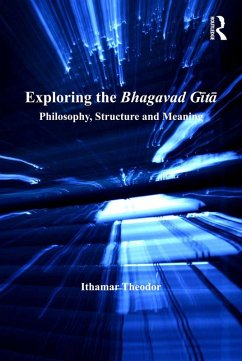The Bhagavad Gita is a unique literary creation but deciphering its meaning and philosophy is not easy or simple. This careful study of the Bhagavad Gita approaches the ancient text with a modern mind and offers a unifying structure which is of a universal relevance. Combining the philosophical-theoretical with the ethical-practical, Ithamar Theodor locates his study within comparative theology and identifies the various layers of meaning. The full text of the Bhagavad Gita is presented in new translation, divided into sections, and accompanied by depth commentary. This book makes the Bhagavad Gita accessible to a wide variety of readers, helping to make sense of this great spiritual classic which is one of the most important texts of religious Hinduism.
Dieser Download kann aus rechtlichen Gründen nur mit Rechnungsadresse in A, B, BG, CY, CZ, D, DK, EW, E, FIN, F, GR, HR, H, IRL, I, LT, L, LR, M, NL, PL, P, R, S, SLO, SK ausgeliefert werden.

